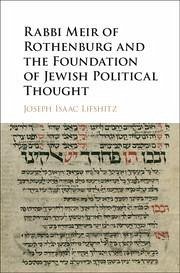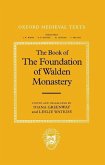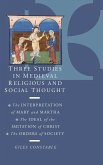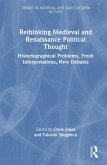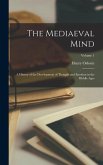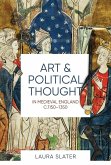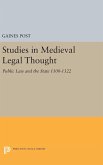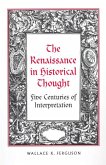Joseph Isaac Lifshitz
Rabbi Meir of Rothenburg and the Foundation of Jewish Political Thought
Schade – dieser Artikel ist leider ausverkauft. Sobald wir wissen, ob und wann der Artikel wieder verfügbar ist, informieren wir Sie an dieser Stelle.
Joseph Isaac Lifshitz
Rabbi Meir of Rothenburg and the Foundation of Jewish Political Thought
- Gebundenes Buch
- Merkliste
- Auf die Merkliste
- Bewerten Bewerten
- Teilen
- Produkt teilen
- Produkterinnerung
- Produkterinnerung
This book examines the political thought of Rabbi Meir of Rothenburg, the most important thirteenth century German Rabbi.
Andere Kunden interessierten sich auch für
![The Book of the Foundation of Walden Monastery The Book of the Foundation of Walden Monastery]() Diana Greenway / Leslie Watkiss (eds.)The Book of the Foundation of Walden Monastery284,99 €
Diana Greenway / Leslie Watkiss (eds.)The Book of the Foundation of Walden Monastery284,99 €![Three Studies in Medieval Religious and Social Thought Three Studies in Medieval Religious and Social Thought]() Giles ConstableThree Studies in Medieval Religious and Social Thought119,99 €
Giles ConstableThree Studies in Medieval Religious and Social Thought119,99 €![Rethinking Medieval and Renaissance Political Thought Rethinking Medieval and Renaissance Political Thought]() Rethinking Medieval and Renaissance Political Thought186,99 €
Rethinking Medieval and Renaissance Political Thought186,99 €![The Mediaeval Mind; a History of the Development of Thought and Emotion in the Middle Ages; Volume 1 The Mediaeval Mind; a History of the Development of Thought and Emotion in the Middle Ages; Volume 1]() Henry Osborn TaylorThe Mediaeval Mind; a History of the Development of Thought and Emotion in the Middle Ages; Volume 143,99 €
Henry Osborn TaylorThe Mediaeval Mind; a History of the Development of Thought and Emotion in the Middle Ages; Volume 143,99 €![Art and Political Thought in Medieval England, C.1150-1350 Art and Political Thought in Medieval England, C.1150-1350]() Laura SlaterArt and Political Thought in Medieval England, C.1150-1350136,99 €
Laura SlaterArt and Political Thought in Medieval England, C.1150-1350136,99 €![Studies in Medieval Legal Thought Studies in Medieval Legal Thought]() Gaines PostStudies in Medieval Legal Thought197,99 €
Gaines PostStudies in Medieval Legal Thought197,99 €![The Renaissance in Historical Thought The Renaissance in Historical Thought]() Wallace K. FergusonThe Renaissance in Historical Thought51,99 €
Wallace K. FergusonThe Renaissance in Historical Thought51,99 €-
-
-
This book examines the political thought of Rabbi Meir of Rothenburg, the most important thirteenth century German Rabbi.
Produktdetails
- Produktdetails
- Verlag: Cambridge University Press
- Seitenzahl: 273
- Erscheinungstermin: 29. Oktober 2015
- Englisch
- Abmessung: 237mm x 158mm x 21mm
- Gewicht: 531g
- ISBN-13: 9781107008243
- ISBN-10: 1107008247
- Artikelnr.: 43678473
- Herstellerkennzeichnung
- Libri GmbH
- Europaallee 1
- 36244 Bad Hersfeld
- gpsr@libri.de
- Verlag: Cambridge University Press
- Seitenzahl: 273
- Erscheinungstermin: 29. Oktober 2015
- Englisch
- Abmessung: 237mm x 158mm x 21mm
- Gewicht: 531g
- ISBN-13: 9781107008243
- ISBN-10: 1107008247
- Artikelnr.: 43678473
- Herstellerkennzeichnung
- Libri GmbH
- Europaallee 1
- 36244 Bad Hersfeld
- gpsr@libri.de
Joseph Isaac Lifshitz is a senior lecturer at the Shalem College and a fellow of the Goldstein-Goren Diaspora Research Center at Tel Aviv University. He also teaches Talmud at R' Yitzchak Yechiel Yeshiva in Jerusalem. His research areas include Jewish philosophy, Talmud, Jewish law, Jewish history, and political theory. He has published widely on the law and philosophy of the Sabbath and on Jewish economic thought.
Part I. Introduction: 1. Framing the discussion: overview of the literature
2. Methodology: identifying the relevant texts
3. Methodology: Halakha and Agada - laws, principles, and ideology
4. Overview of the book
Part II. Historical Background: 5. R. Meir of Rothenburg and his teachers and students
6. The history of the Jewish people and Jewish communities in Germany and Northern France (1000-1300)
7. The development of Talmudic exegesis in Germany and Northern France (1000-1300)
8. Highlights of R. Meir's biography
9. D. R. Meir's Halakhic approach
10. Political theory in Germany and Northern France (1000-1300)
Part III. Politics as Private Interest: 11. Community as partnership
12. The role of custom in monetary laws
13. Beyond partnership: the community as corporation
Part IV. The Sacred Nature of the Political Sphere: 14. The common good
15. Majority-rule
16. Agency and representation
17. The theological definition of community
Part V. Conclusion: 18. Politics as extra-legal activity: ambiguity in R. Meir's works
19. The theology of unity and despotism.
2. Methodology: identifying the relevant texts
3. Methodology: Halakha and Agada - laws, principles, and ideology
4. Overview of the book
Part II. Historical Background: 5. R. Meir of Rothenburg and his teachers and students
6. The history of the Jewish people and Jewish communities in Germany and Northern France (1000-1300)
7. The development of Talmudic exegesis in Germany and Northern France (1000-1300)
8. Highlights of R. Meir's biography
9. D. R. Meir's Halakhic approach
10. Political theory in Germany and Northern France (1000-1300)
Part III. Politics as Private Interest: 11. Community as partnership
12. The role of custom in monetary laws
13. Beyond partnership: the community as corporation
Part IV. The Sacred Nature of the Political Sphere: 14. The common good
15. Majority-rule
16. Agency and representation
17. The theological definition of community
Part V. Conclusion: 18. Politics as extra-legal activity: ambiguity in R. Meir's works
19. The theology of unity and despotism.
Part I. Introduction: 1. Framing the discussion: overview of the literature
2. Methodology: identifying the relevant texts
3. Methodology: Halakha and Agada - laws, principles, and ideology
4. Overview of the book
Part II. Historical Background: 5. R. Meir of Rothenburg and his teachers and students
6. The history of the Jewish people and Jewish communities in Germany and Northern France (1000-1300)
7. The development of Talmudic exegesis in Germany and Northern France (1000-1300)
8. Highlights of R. Meir's biography
9. D. R. Meir's Halakhic approach
10. Political theory in Germany and Northern France (1000-1300)
Part III. Politics as Private Interest: 11. Community as partnership
12. The role of custom in monetary laws
13. Beyond partnership: the community as corporation
Part IV. The Sacred Nature of the Political Sphere: 14. The common good
15. Majority-rule
16. Agency and representation
17. The theological definition of community
Part V. Conclusion: 18. Politics as extra-legal activity: ambiguity in R. Meir's works
19. The theology of unity and despotism.
2. Methodology: identifying the relevant texts
3. Methodology: Halakha and Agada - laws, principles, and ideology
4. Overview of the book
Part II. Historical Background: 5. R. Meir of Rothenburg and his teachers and students
6. The history of the Jewish people and Jewish communities in Germany and Northern France (1000-1300)
7. The development of Talmudic exegesis in Germany and Northern France (1000-1300)
8. Highlights of R. Meir's biography
9. D. R. Meir's Halakhic approach
10. Political theory in Germany and Northern France (1000-1300)
Part III. Politics as Private Interest: 11. Community as partnership
12. The role of custom in monetary laws
13. Beyond partnership: the community as corporation
Part IV. The Sacred Nature of the Political Sphere: 14. The common good
15. Majority-rule
16. Agency and representation
17. The theological definition of community
Part V. Conclusion: 18. Politics as extra-legal activity: ambiguity in R. Meir's works
19. The theology of unity and despotism.

